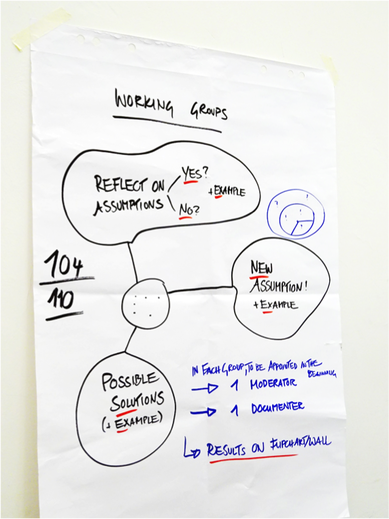Track III Dialogues in Ukraine - Trends and Challenges

"Track III Dialogues in Ukraine - Major Trends and Challenges” was a collaborative research project carried out in 2016-2017 by the Center for Peace Mediation and the Jean Monnet Centre of Excellence in EU Studies at Kyiv-Mohyla Academy, Ukraine.
The project was the first research-based attempt to better understand the difficulties in dialogues on civil society level in Ukraine with the explicit goal to build a scientific basis for systematic responses to these difficulties.
Following an action research approach, the project engaged Ukrainian and international mediation and dialogue practitioners in the analysis of challenges and strategies to tackle them.
The empirical data collected in the course of the project revealed six patterns and possible related risks:
1) Different dialogue concepts and an overuse of the term “dialogue“ risk to undermine its value
2) A focus on “technical” instead of “existential” issues bears unclear risks
3) A geographical focus on the East of Ukrainian/Government controlled territories risks further societal polarization
4) A focus on mainstream political views in dialogues risks further exclusion of “the other Ukrainians”
5) A quantitative overrepresentation of women at track III is not leading to their qualitative influence
6) Dialogues that are not embedded in sustainable project strategies risk to have low impact
The policy paper “Track III Dialogues in Ukraine: Major Patterns and Resulting Risks” by Tatiana Kyselova and Julia von Dobeneck summarizes the main findings and illustrates its implications.
The research report "Track III Dialogues in Ukraine: Full Research Report" provides a more comprehensive account of the key findings and quotes from interviews as well as of the methodical approach taken in the project.
The project was supported by the Robert Bosch Foundation. Tatiana Kyselovas' research was funded by the EU Seventh Framework programme for research and innovation under the Marie Skłodowska-Curie grant agreement No 609402 - 2020 researchers: Train to Move (T2M).
Tatiana Kyselova afterwards continued the research by testing the identified patterns and gain quantitative data. The survey results have confirmed hypotheses as to four patterns and partly confirmed hypotheses as to the remaining two patterns. See the analytical report. For all further research activities on dialogue in Ukraine visit the website of the Mediation and Dialogue Research Center, National University of Kyiv-Mohyla Academy.
History research project:
Starting point of the project in 2016 was an Expert Round Table (ERT I), hosted by the Center for Peace Mediation. The insights are summarized in the Discussion Paper "Challenges to Mediation and Dialogue in Ukraine: Distrust in Procedures and A Dysfunctional Market" (English / Ukrainian).
The project was the first research-based attempt to better understand the difficulties in dialogues on civil society level in Ukraine with the explicit goal to build a scientific basis for systematic responses to these difficulties.
Following an action research approach, the project engaged Ukrainian and international mediation and dialogue practitioners in the analysis of challenges and strategies to tackle them.
The empirical data collected in the course of the project revealed six patterns and possible related risks:
1) Different dialogue concepts and an overuse of the term “dialogue“ risk to undermine its value
2) A focus on “technical” instead of “existential” issues bears unclear risks
3) A geographical focus on the East of Ukrainian/Government controlled territories risks further societal polarization
4) A focus on mainstream political views in dialogues risks further exclusion of “the other Ukrainians”
5) A quantitative overrepresentation of women at track III is not leading to their qualitative influence
6) Dialogues that are not embedded in sustainable project strategies risk to have low impact
The policy paper “Track III Dialogues in Ukraine: Major Patterns and Resulting Risks” by Tatiana Kyselova and Julia von Dobeneck summarizes the main findings and illustrates its implications.
The research report "Track III Dialogues in Ukraine: Full Research Report" provides a more comprehensive account of the key findings and quotes from interviews as well as of the methodical approach taken in the project.
The project was supported by the Robert Bosch Foundation. Tatiana Kyselovas' research was funded by the EU Seventh Framework programme for research and innovation under the Marie Skłodowska-Curie grant agreement No 609402 - 2020 researchers: Train to Move (T2M).
Tatiana Kyselova afterwards continued the research by testing the identified patterns and gain quantitative data. The survey results have confirmed hypotheses as to four patterns and partly confirmed hypotheses as to the remaining two patterns. See the analytical report. For all further research activities on dialogue in Ukraine visit the website of the Mediation and Dialogue Research Center, National University of Kyiv-Mohyla Academy.
History research project:
Starting point of the project in 2016 was an Expert Round Table (ERT I), hosted by the Center for Peace Mediation. The insights are summarized in the Discussion Paper "Challenges to Mediation and Dialogue in Ukraine: Distrust in Procedures and A Dysfunctional Market" (English / Ukrainian).

